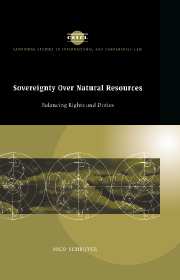Book contents
- Frontmatter
- Contents
- List of boxes, figures and tables
- Preface
- Acknowledgments
- List of abbreviations
- List of main symbols used in UN documents
- Glossary
- Table of cases
- 1 Introduction
- PART I The birth and development of the principle: the UN General Assembly as midwife
- PART II Natural-resource law in practice: from creeping national jurisdiction towards international co-operation
- Introductory remarks to Part II
- 6 International investment law: from nationalism to pragmatism
- 7 The law of the sea: extension of control over marine resources
- 8 International environmental law: sovereignty versus the environment?
- PART III Balancing rights and duties in an increasingly interdependent world
- Appendices
- Bibliography
- Index
- Books in the series
8 - International environmental law: sovereignty versus the environment?
Published online by Cambridge University Press: 23 October 2009
- Frontmatter
- Contents
- List of boxes, figures and tables
- Preface
- Acknowledgments
- List of abbreviations
- List of main symbols used in UN documents
- Glossary
- Table of cases
- 1 Introduction
- PART I The birth and development of the principle: the UN General Assembly as midwife
- PART II Natural-resource law in practice: from creeping national jurisdiction towards international co-operation
- Introductory remarks to Part II
- 6 International investment law: from nationalism to pragmatism
- 7 The law of the sea: extension of control over marine resources
- 8 International environmental law: sovereignty versus the environment?
- PART III Balancing rights and duties in an increasingly interdependent world
- Appendices
- Bibliography
- Index
- Books in the series
Summary
This chapter identifies and analyzes emerging international norms which are relevant to nature conservation and environmental protection and which have a bearing on the scope and substance of permanent sovereignty over natural resources. The chapter discusses: the concept of international environmental law; the development of international environmental law and its codification; international case law as far as relevant to the concept of sovereignty and environmental preservation; twelve main principles of international environmental law as they emerge from various sources of international law; and the question whether contradictions and tensions exist between the concept of sovereignty, including sovereignty over natural resources, and international environmental law.
The concept of international environmental law
International environmental law is a relatively young branch of international law. Since the 1970s, in particular, it has developed in response to a mounting concern for the state of the environment. However, this is not to say that before the 1970s environmentally relevant law did not exist. As early as the nineteenth century, marine fisheries agreements were concluded as were treaties containing anti-polluting provisions and treaties regulating fisheries in international rivers. During the first decades of this century treaties relating to the protection of certain species of wildlife (migratory birds and fur seals) and flora and fauna in general were adopted and, since the 1930s, anti-pollution treaties have been concluded.
Furthermore, legal arrangements came into being which are environmentally relevant even though inspired by other objectives.
- Type
- Chapter
- Information
- Sovereignty over Natural ResourcesBalancing Rights and Duties, pp. 231 - 252Publisher: Cambridge University PressPrint publication year: 1997
- 1
- Cited by



